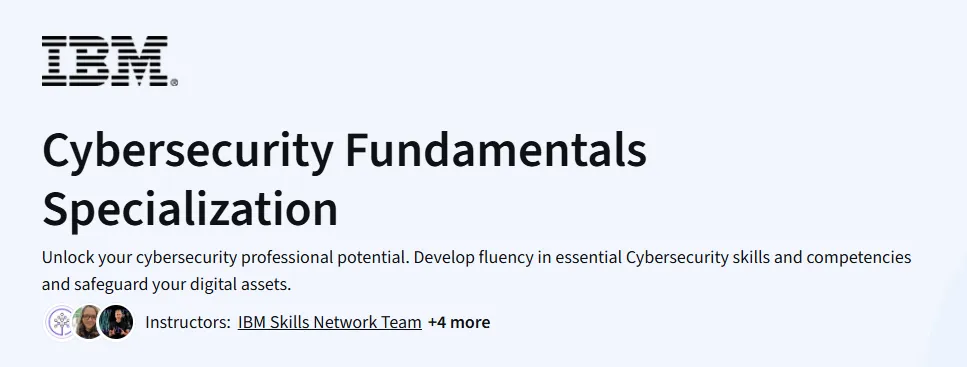What will you learn in Cybersecurity Fundamentals Specialization Course
Understand core cybersecurity concepts, including risk, threat modeling, and cryptography.
Learn how to secure systems, networks, and data through technical and strategic defenses.
Grasp the fundamentals of authentication, identity management, and system vulnerabilities.
Apply critical thinking to analyze cyber threats and implement appropriate controls.
Program Overview
Course 1: Introduction to Cybersecurity
⏱️ 2 weeks
Topics: Cyber risks, attacks, security principles, confidentiality
Hands-on: Scenario-based threat identification
Course 2: Cybersecurity Roles, Processes & Operating System Security
⏱️ 2 weeks
Topics: Roles in cybersecurity, Linux security, access controls
Hands-on: Shell command practice, role assessment exercises
Course 3: Cybersecurity: The CISO’s View
⏱️ 2 weeks
Topics: Governance, policies, CISO responsibilities
Hands-on: Risk analysis and strategic control mapping
Course 4: Network Security & Database Vulnerabilities
⏱️ 2 weeks
Topics: TCP/IP, firewalls, intrusion detection, SQL injection
Hands-on: Analyzing packet traffic, simulating database vulnerabilities
Course 5: Application Security – Authentication & Access Control
⏱️ 2 weeks
Topics: Authentication types, SSO, 2FA, identity theft
Hands-on: Designing secure login protocols
Course 6: Cyber Attack Countermeasures
⏱️ 2 weeks
Topics: Malware, phishing, DDOS, defense layers
Hands-on: Simulated threat mitigation plan
Get certificate
Job Outlook
Cybersecurity is one of the fastest-growing fields globally.
Job roles include Security Analyst, Network Security Engineer, and CISO.
The global shortage of cybersecurity professionals exceeds 3.5 million.
High earning potential: Cybersecurity analysts earn an average of $90,000–$120,000 annually.
Specification: Cybersecurity Fundamentals Specialization
|
FAQs
- The course is designed to introduce fundamental concepts, so no prior experience is strictly required.
- Learners with basic computer literacy can follow along with the modules.
- Self-paced learning allows beginners to revisit complex topics.
- Supplementary reading or tutorials on networking can help accelerate understanding.
- Confidence in problem-solving and logical thinking will aid comprehension.
- This specialization provides foundational knowledge aligned with industry practices.
- It introduces essential concepts that many certification exams (like CompTIA Security+) require.
- Direct exam preparation is not included, but it serves as a strong stepping stone.
- Additional practice exams and certification-specific guides are recommended.
- Completing the specialization can boost credibility when pursuing certifications.
- The course includes labs simulating real cybersecurity environments.
- Exercises cover network security, threat detection, and risk assessment scenarios.
- Learners gain exposure to tools commonly used in the industry.
- While comprehensive, real-world projects may require additional self-study.
- Practical skills gained help in building a portfolio for internships or entry-level roles.
- It provides a foundational understanding suitable for entry-level roles.
- Skills gained are relevant for security analyst, IT support, or network security roles.
- Combining this with certifications enhances employability.
- Networking with peers and mentors can improve career transition opportunities.
- Real-world projects and labs help demonstrate applied competency to potential employers.
- Estimated completion is around 3–5 months at a part-time pace.
- Weekly effort of 3–5 hours is generally sufficient to keep up with lectures and exercises.
- Consistent practice in labs accelerates understanding and retention.
- Flexible pace allows adjustments based on personal schedule.
- Time invested upfront can save future learning time when applying concepts in real-world scenarios.





